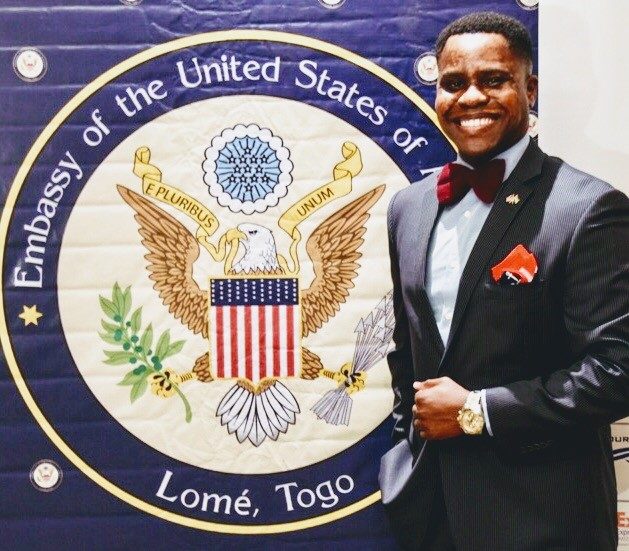
by Madison McHugh | Sep 12, 2018 | Graduate Students, Internship Experiences
My name is Erick Agbleke. While in pursuit of my graduate studies in International Relations and Diplomacy, along with specializations in International Security and Global Negotiation and Conflict Management, I was given the opportunity to intern with the State Department at a US Embassy of my choice. Since I was born in Togo, West Africa, I opted to spend 10 weeks at the Lomé Embassy with the Political and Economic (Pol-Econ) section of the mission. I wanted to return to my country of birth after spending 16 years abroad, to witness and study what kind of effects that U.S. international policies would have on a political climate I am familiar with.
A highlight of my internship with the State Department was a project assigned to me by the Chief of Section (CoS) to strengthen my security background. I wrote and recommended a strategy outline to combat wildlife trafficking in Togo based on the Eliminate Neutralize and Disrupt (END) Wildlife Trafficking Act of 2016. My recommendations, if approved by the State Department’s Office of Economic Growth, Energy and Environment, would be implemented as a policy and included in an annual congressional report. I relied on past project management skills that I developed through my professional career as well as my data collection skills to complete the necessary analysis.
Located south of Burkina Faso and east of Benin, Togo has become a transit state for ivory traffickers smuggling illegal goods. The traffickers take advantage of the porous borders and enter Togo with ivory in its raw form and make their way to Lomé to transform the ivory into art relics transported and sold elsewhere. Lomé is a strategic city for the smugglers because it gives them multitude avenues of exit. It is equipped with an international airport and a seaport serving as the maritime hub for the region, and smugglers utilize these avenues of travel to take ivory into south-east Asia. After my initial analysis of the wildlife trafficking framework in Togo, I was able to address the shortfalls and recommend improvements on how to the government could benefit from a partnership with the U.S.
Interning with the State Department has intensified my desire to become a diplomat and work with other countries to overcome the same challenges we share across the world. In my coursework, I learn and process instances where all areas of international relations are intertwined, amplified by my hands-on experience abroad. I have gained a deeper understanding on how security, diplomacy, conflict resolution and economic development must reconcile with one another to advance towards a common solution. In reflecting on the experience, I would recommend this internship to my fellow colleagues, as it is a great way to gain insight into the wonderful work we do abroad as a country. It is also a great opportunity to apply and test the plethora of theories we learn and discuss in the classroom with our professors.
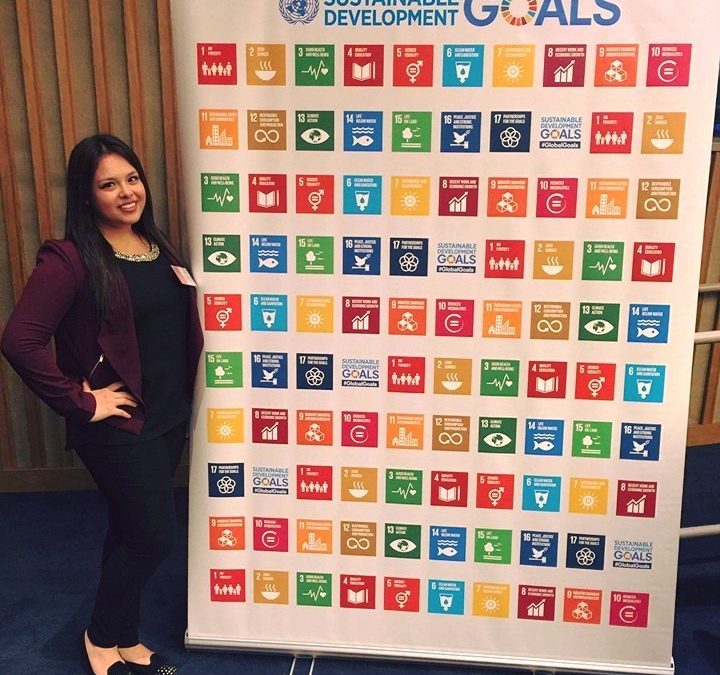
by Madison McHugh | Jan 10, 2018 | Internship Experiences, Undergraduate Students
My name is Laura Muñoz, and I am currently an undergraduate student at the School of Diplomacy and International Relations at Seton Hall University. As part of my final semester of my undergraduate career, I completed a full-time internship at the 20th District Legislative Office in Union, New Jersey alongside the Director of Constituents as well as Assemblywoman Annette Quijano.
As an intern, I experienced magnificent opportunities, met amazing public officials, and learned about the in-depth processes of local politics. My main responsibilities as an intern at the legislative office was assisting Union County constituents who visited the office regarding claims, renewals, and referrals. In addition, I was often placed at the Elizabeth office to complete hands-on work.
During my time with the 20th District, the office partnered up with other legislative teams to provide supplies to Puerto Rico, and I assisted in facilitating donation teams. We completed many more local and state-wide events and community fundraisers. I also completed work in the field with campaign-related volunteering outside the office for Assemblywoman Quijano, particularly during the gubernatorial debate between the two governor candidates for the New Jersey election, Phil Murphy and Kim Guadagno. In addition, I was invited by the Chief of Staff for Senator Lesniak to see Barack Obama’s endorsement speech for Phil Murphy – an incredible event!
My internship with the 20th District has helped me a lot with practicing diplomacy in the real world. This internship has helped me put my skills into action. Networking is a big part of what our professors highly encourage, and I have done a lot of networking with my internship. This internship has made me realize how much more I want to work in the international field. Yes, I have learned a lot of local politics and how important it is; however, I do like more of relations between countries and how that affects the entire world. My internship at the office has also reminded me of the importance of remaining educated. Having conversations with people has been very rewarding because I use the knowledge and skills that I have learned in class, and it is amazing to have a conversation with someone about world politics and give my informed opinion.
I would recommend this internship to anyone in the Diplomacy school because I believe that the 20th Legislative office is one of the most diverse offices that New Jersey has. This internship thus far has helped me learn, grow, and realize how important it is to practice diplomacy and do what you love.
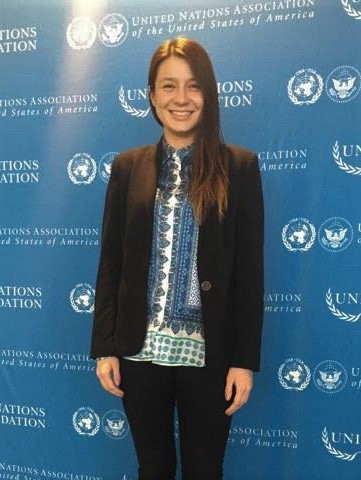
by Madison McHugh | Sep 20, 2017 | Internship Experiences, Undergraduate Students
My name is Daniela Uribe, and I am a senior student of Diplomacy and International Relations from Seton Hall University. I am from Colombia and moved to the United States four years ago to pursue my college education. As part of my learning experience at Seton Hall, I had the chance to intern at the Consulate of Colombia in New Jersey for seven months. The Consulate of Colombia is a government organization that represents and assists its nationals in international territories in order to provide legal assistance, notarize documents, and protect the interest of its citizens.
I decided I wanted to intern at the Colombian Consulate because the country was beginning a new development in its national security since the government’s negotiation and national referendum with the largest terrorist group in the territory, Las FARC. Since the Consulate represents the government of Colombia in the U.S., its role in this development was to organize, educate, and prepare nationals to participate in the referendum. Thanks to this call I was able to start interning at the consulate the week after I applied.
There was a lot of work to be done. As a Consular Intern, I assisted government officials in their consular assignments and assisted nationals with processes such as voting and serving as judges the day of the referendum. In addition, I contacted nationals and spoke effectively about the importance of participating in the referendum, including clarifying inaccurate information. One of the common questions was about viability to vote – whether one fulfulls the requirements set to vote. The National Registry provides ID numbers for nationals to vote in a specific place, and they needed to be informed of the location.
Another large role I played was educating people about the agreement. The agreement was 150 pages, and I needed to know it very well. If I had not studied Diplomacy and International Relations, I would have not been able to understand the type of language the document contained.
Dr. Tinker’s Public International Law course taught me about the importance of language in this type of document; how it could have different interpretations from different parties and how it becomes binding; how much responsibility each party has and the mechanisms of implementation. My class experience prepared me to raise questions and pose concerns during training times and participate in scholarly discussions during the preparation period.
After this experience, I was able to better understand the role and challenges of the consulates and government officials. They cannot advocate for a specific vote, but they must provide all the tools to inform the public to decide freely and support them throughout the process.
I enjoyed every second of the experience. I worked so hard, it felt like a full-time job, but I also learned so much about government and public diplomacy. We also faced challenges, too, during the vote: people showing propaganda, adding extra votes, or voting when they were not registered. It was very interesting being both central to the event and behind-the-scenes.
After the vote, I was selected to help tally the votes and upload the results for New Jersey. It was an honor and privilege to serve my country in this way.
I felt that this was my real job (even while unpaid!) in many ways, but the quality of learning I received from this experience made it so worthy.
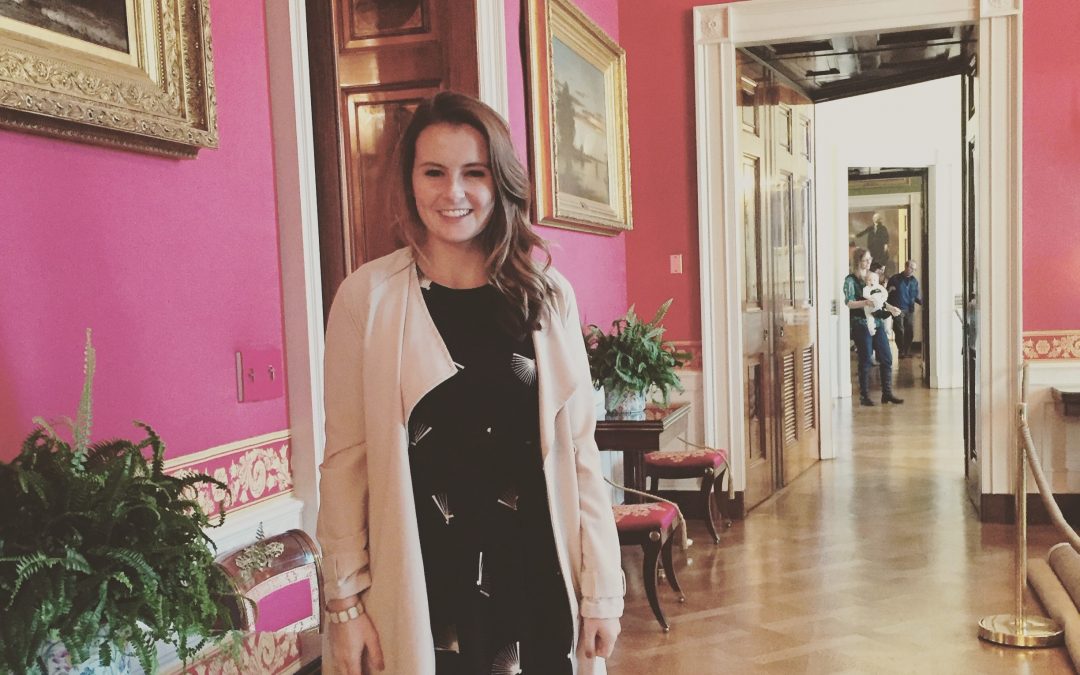
by Thomas Ashe | Feb 6, 2017 | Internship Experiences, Undergraduate Students
My name is Courtney Boland. My experience living and working in Washington D.C. was an eye-opening experience. At the United States Agency for International Development (USAID), I participated in projects that extended throughout the world, all with the overarching goal of ending extreme poverty and promoting resilient societies. In the Bureau of Legislative and Public Affairs, I worked with several different departments and witnessed the wide range of agency operations.
Right from the beginning, I dove right in to support the agency’s work at the United Nations General Assembly (UNGA). I worked previously at the UNGA during my time as an intern at the British Consulate General in New York City so I was able to smoothly transition into my new role. Furthermore, when Hurricane Matthews devastated the Caribbean, specifically Haiti, I had the opportunity to see how USAID responded to natural disasters and humanitarian crises. This was a particularly enormous task for the Public Affairs team. All the staff members, including myself, had to ensure accurate information was disseminated out to the public and to USAID’s mission in Haiti as quickly as possible. I gained first-hand experience in the preparation and “war-room “style of operations for disasters.
While all the work I contributed to at USAID has been exciting, the most rewarding was working for First Lady Michelle Obama’s Let Girls Learn initiative. I always admired her global campaign to bring education to 62 million girls who are currently not enrolled in school. The experience to support that mission was certainly very surreal. I tailored my academic studies to gender equality and the importance of female education, which served as key issues of interest for USAID. I assisted in strategic communications for the premiere of The First Lady’s CNN documentary “We Will Rise,” which focused on her trip to Liberia and Morocco where she met with Let Girls Learn beneficiaries. I also visited the White House with my supervisor to meet with our FLOTUS Office counterparts and was even given the opportunity to have a tour of the White House — a D.C. dream come true.
Working for the U.S. government provided me with the opportunity to learn more about the inner-operations of the federal government. Additionally, I witnessed how government agencies prepare for transition from one administration to another. I did not realize how intensive it is and how many people actually leave the agency once President Obama’s administration comes to an end. This is important for me to experience especially if I plan to work in the U.S. government again one day. This experience made it ever more clear to me that I want to continue to work in Washington D.C. following graduation in May.
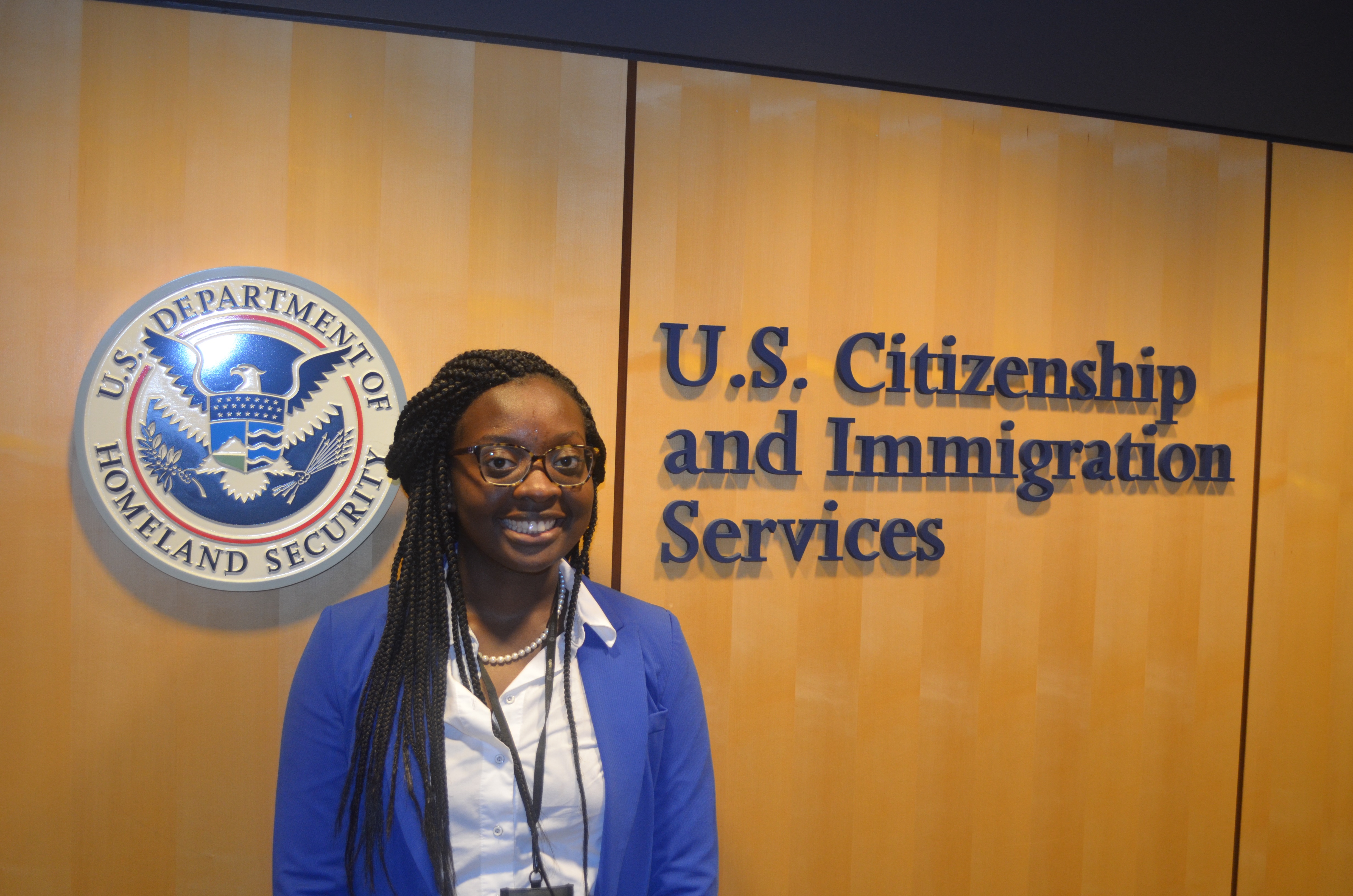
by Catherine Ruby | Aug 18, 2016 | Graduate Students, Internship Experiences
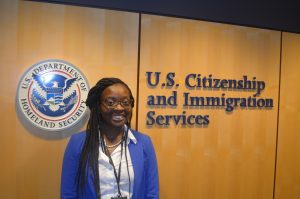
I am Nina Robinson, a dual degree candidate of the M.A. programs in Diplomacy and Asian Studies. I interned with the Department of Homeland Security: United States Citizenship and Immigration Services (USCIS), specifically with the Office of Privacy. My long-term goal is to become a Foreign Service Officer and to one day serve as a Career Ambassador. Since high school, after studying in China for two consecutive summers, I knew that I wanted to dedicate my life to a career in Diplomacy.
Essentially, my desire to hone my skills and apply the knowledge that I learned in my Diplomacy classes; gain Federal Government experience; and to prepare for a career serving the United States, is what led me to pursue an internship with DHS-USCIS. The Department of Homeland Security was created after the September 11, 2001 terrorist attacks, to safeguard the United States’ border. The agency’s mission is to protect all people, including U.S. citizens, permanent legal residents, immigrants, and non-U.S. citizens. The Department of Homeland Security has offices almost all over the world, which assists those who wish to become citizens and seek asylum due to fear of persecution or danger.
Working with the Department of Homeland Security- United States Citizenship and Immigration Services, introduced me to the many avenues that one may take to establish a federal career focused on international relations. The Office of Privacy, although a small office and often confused with civil liberties or security, plays an important role in the agency. USCIS works to ensure that citizens around the world have the opportunity to become U.S. citizens and provides benefits and services for immigrants. The Office of Privacy works to ensure that the work conducted in USCIS promotes transparency in the government and protects its clients who include non-U.S. citizens and immigrants. The Privacy Act of 1974, which was enacted after the Watergate scandal with then-President Richard Nixon, is the cornerstone of my office. This Act is what helps the Office of Privacy guarantee that information being collected from the people by the government is being protected. Our office ensures that immigrants’ and citizens’ personal information, provided to the Department of Homeland Security and the United States Citizenship and Immigration Services, is being protected, which includes informing clients of what their information is being used for and how it will be used.
In the short period of time I interned here, I have learned a tremendous amount. I have attended four trainings, all which are exclusive to the analysts and officers in the Office of Privacy. As not to go too far into specifics, I have learned about the importance of encrypting PII (Personal Identifiable Information) and various information sharing database sources that the United States and other partner countries use to identify suspected terrorists. Along with training, my office has also provided mentorship, helping me to familiarize myself with various Privacy Act Laws as it relates to the Federal Government and offering career related advice. My life-long dream of becoming an ambassador has not changed. However, Privacy has become a big issue in the world of International Affairs and is a growing field. Students who are looking to put their diplomacy and analytical skills to use may find Privacy an interesting and exciting alternative to the Diplomacy field.
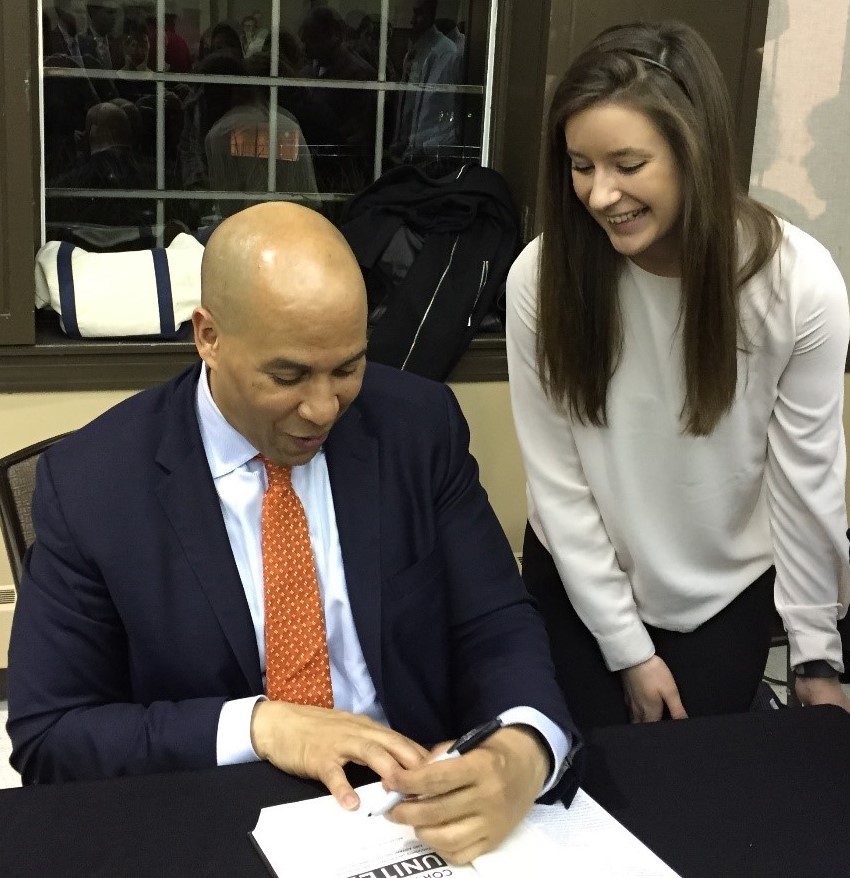
by Carolin Braxenthaler | May 5, 2016 | Internship Experiences, Undergraduate Students
Most people would describe the city of Newark as a struggling neighborhood of crime and poverty. However, my experience working for the Office of Senator Cory Booker has opened my eyes to see Newark and many other cities as thriving hubs of opportunity and development.
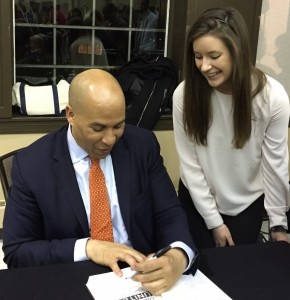
Diplomacy student Clare Duda with Senator Cory Booker
Senator Booker splits his time between Washington D.C. and New Jersey for congressional duties, travels in support of the 2016 presidential elections, and is currently on a book tour for his new bestseller “United”. As the Senator reports to his busy schedule, his office staff is the engine that keeps the congressional machine running. The Senator’s office in Newark is full of youthfully charged energy ready to take on any constituent inquiry, state development, and congressional opportunity released to the Senator. As an intern for a federal office, the day begins with a review of daily newspapers to keep each of the three senate offices, located in Washington D.C., Camden, and Newark, up to date with current events and happenings involving the state of New Jersey and Senator Booker himself. As time in the office of the Senator has passed I have had the opportunity to work with constituent advocates, case workers, and special project teams to work on policy memos, research speech materials, and respond to constituent requests.
Constituents usually write to the Senator when they are in need of help and have nowhere else to turn. I have had the opportunity to work on cases regarding immigration, environmental concerns, military affairs, health, and education. Along with deciphering if a new case can be developed by a federal office, I have interacted with constituents one on one, gaging cases and assigning each one to the proper caseworker to take care of their issue. The Senator’s office is dedicated to assisting constituents with concerns. I have become a part of a team which has reached out on behalf of immigration visas, retrieved documents from the VA, and worked with Medicaid providers to deliver health care resources to constituents who could not afford them. As time has passed in the Newark office I have witnessed the level of dedication each staff member has to their job and the citizens of New Jersey. The senatorial staff has exemplified dedication, professionalism, and compassion within the workplace and I would encourage anyone to write to the office of Senator Booker if they were ever to have a congressional inquiry.
As an international relations and diplomacy major I focus my interest in the national security and intelligence sectors of the federal government. I use talents developed through the School of International Relations and Diplomacy to brief policy documents, critically analyze cases, and develop writing samples for community outreach. Working for Senator Booker has provided me with the foresight of how a federal office operates and has furthered my interest in a future of public service. From my internship I gained skills of time management, adoption of new ideas, and adaptation to new opportunities. Offering support to the congressional staff and the constituents of New Jersey has been both rewarding and fulfilling. Similar to the city of Newark, I realized the potential I hold in creating change, whether big or small; every action I take is growth. Working for the Office of the Senator has given me construction materials to expand my own personal development.
by Carolin Braxenthaler | May 5, 2016 | Graduate Students, Internship Experiences
My name is John “Jack” Rotticci and I am in my second semester studying a Master of Arts in Diplomacy and International Relations. I majored in international business during my undergraduate studies and was excited to continue learning about international trade as part of my specializations at Seton Hall’s School of Diplomacy, which are International Economics and Development, and Global Negotiation and Conflict Management. This semester, I am taking an internship course that provides both a look at the combination of knowledge and skills required to perform in the field of international trade, and more specifically, an up-close opportunity to explore the daily operations of a career in commercial advocacy.
My placement is with the U.S. Commercial Service Export Assistance Center, Northern New Jersey, commonly referred to as a USEAC, where a small staff of International Trade Specialists is responsible for assisting in and promoting exports by northern New Jersey manufacturers and service providers. Each International Trade Specialist is responsible for working with a certain group of industries. My role as an intern, or as we have taken to calling it in the office, an “international trade assistant,” is to support the trade specialists in their pursuit of this goal. This is a neat feature of the internship because it allows me to get an introduction and a feel for each industry. This is valuable knowledge as I have already found some industries that I am particularly interested in – and some that I am particularly uninterested in.
Another great feature of my internship at the NNJ USEAC is the group of professionals I work with. The small team environment means that, unlike many internships, I do not spend the day in the basement stapling reports or running for coffee. It can be a challenge because the team truly relies on every member, including me, the intern; however, the office environment makes me feel comfortable asking questions if I am unsure. Furthermore, I am given more responsibilties after I prove that I can handle them.
You will be asked to take on several projects and initiatives at this internship, each with different levels of priority and timelines. It is up to the intern to prioritize time to accomplish what is asked. I have thoroughly appreciated this autonomy as it has provided opportunities to prove my ability to both the team and to myself, to make mistakes and learn from them, to learn in the process of researching and completing a project.
One such type of project is event planning. As an intern at the NNJ USEAC, I helped to organize several informative trade promotion events. I was recently able to help on an Introduction to Exporting to Canada event. While this event was not directly a USEAC event, I worked with partner offices to ensure that the attendees had access to information about all of the assistance services available to them in their efforts to export.
I am also helping to organize an event held in cooperation with the Bureau of Industry and Security (BIS) that focuses on compliance with US export controls. As part of the planning process, I researched export controls and got a better grip on what the federal government is doing to ensure that rogue states cannot profit from illegal or sanctioned international trade.
I find this internship to be much more rewarding than others I have previously completed. This is largely due to the fact that I am treated as a team member as opposed to a temporary intern. The team is committed to ensuring that I am not only given the opportunity to contribute all that my ability will allow, but also, that the internship is actually serving as a learning experience and helping me to better understand the Commercial Service as a potential career path. I would enthusiastically encourage any student interested in international trade and commercial diplomacy to apply.
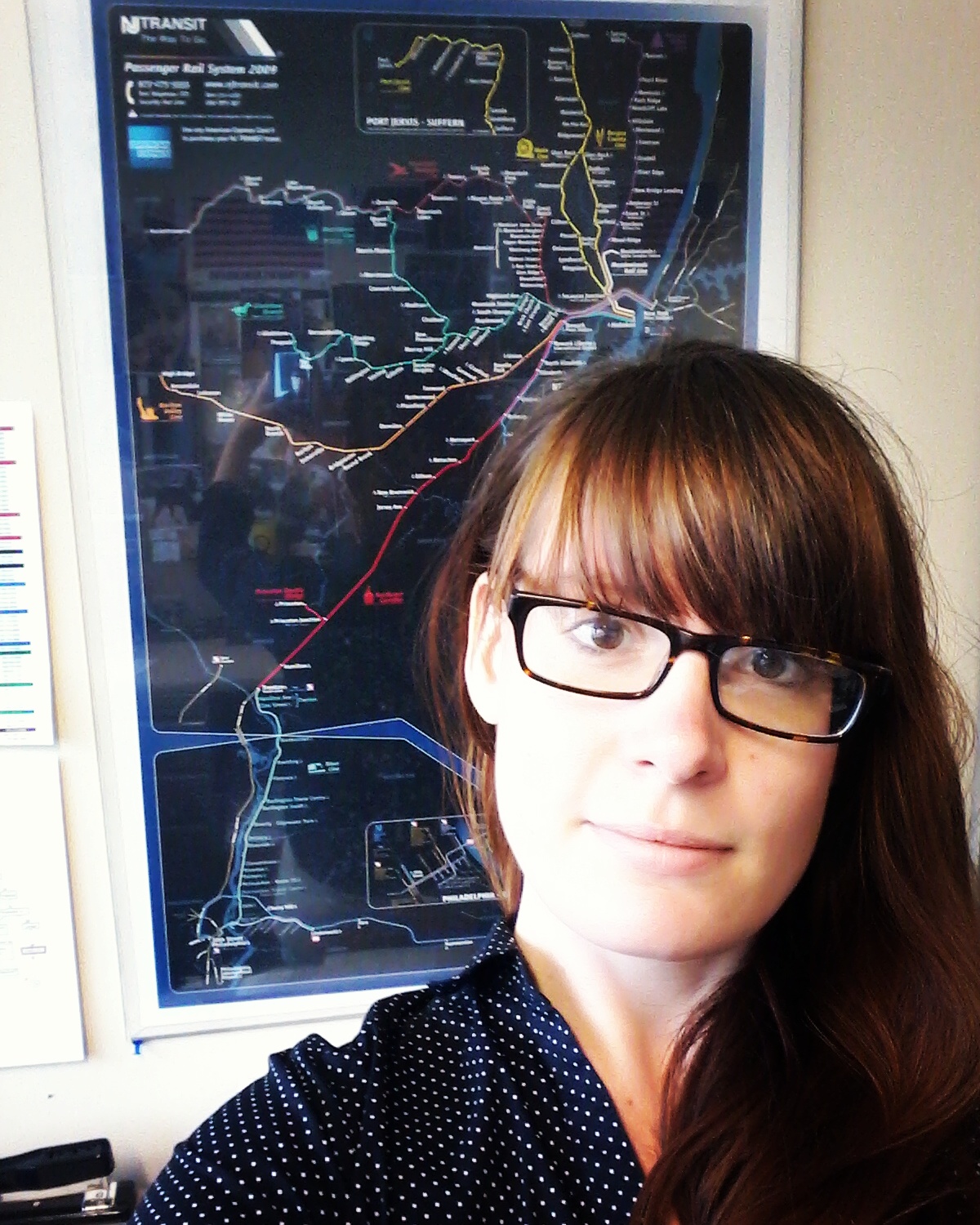
by Carolin Braxenthaler | May 5, 2016 | Graduate Students, Internship Experiences
My interview to be an intelligence intern with the New Jersey Transit Police Department (NJTPD) promised me all the things I had lacked in my first internship. There would be daily tasks, circumstance-specific tasks, and broader projects. I would be thoroughly trained on multiple databases and computer programs. I would assume a small level of responsibility for the activities within the office, and if I had any questions, or faced any roadblocks, they would be addressed. I would, ultimately, learn what I needed to know to eventually get a job as an analyst.
My experience here at the NJTPD intelligence office has been so much more than that. On your first day, you are introduced to a whole floor of people who welcome you enthusiastically and all say, “welcome to the team!” Even if you don’t know it yet, your job has a purpose. It also makes your experience easier to sell to a potential employment opportunity.
There is a perfect combination of learning a lot, very quickly, but with mentors who have the utmost patience for you. The office exudes a beautiful harmony of camaraderie and professionalism. You will have fun, and you will learn. You will go on field trips, have the opportunity to talk to people of all ranks in many contexts, and learn the fundamentals of a state security institution. You will learn how to be productive, and your mistakes will be readily forgiven. If there is a more positive place to fulfill an internship requirement, I can’t imagine one. If you are looking for an internship that will actually involve you in the operations of the system and make you a valuable candidate on the job market, you should seriously consider the NJTPD.
I decided on this internship through conversations with peers who had done it before, and a realization of my own desire to be a part of the intelligence community. This internship allows graduate students a really incredible and understated opportunity to be involved in intelligence work.









